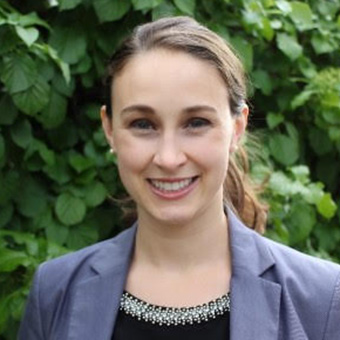Christine McInnis, PhD’15, Neuroscience
 Associate Director, Translational Medicine, Repertoire Immune Medicines
Associate Director, Translational Medicine, Repertoire Immune Medicines
Can you describe your career path and how it has led to your current work?
After completing my Bachelors in biology from Keene State College I moved to Boston and began working in a lab focused on hormones and the brain at the University of Massachusetts Boston. This ignited a strong interest in neuroscience which eventually brought me to Brandeis for the Neuroscience PhD program. While at Brandeis I studied how the immune system is impacted by psychological stress. I realized before graduating that I wanted to go into an industry position and didn't want to pursue a career in academia. I felt I could have a greater impact on human disease working at a Biotech company. I quickly realized that there wasn't much opportunity in industry to work on stress responses so I took a position as a postdoctoral fellow at Brigham and Women's Hospital to really learn more about the immune system. In 2017 I moved to my position at Torque Therapeutics (later became Repertoire Immune Medicines) where we develop a T-cell therapy for patients with cancer. I worked in a few different roles in the company before finding my true passion in translational medicine where I currently work.
What services and/or resources did you use while at Brandeis for your career search?
I looked at a lot of biotech/pharmaceutical company websites to understand what they worked on in order to realize I needed more training to be the best candidate possible for the roles I sought. Once I knew this, I looked at local labs to see who might be doing work that I was qualified enough for but that would offer significant growth opportunities for me to become more formally trained in immunology. I then emailed these professors directly to inquire about potential roles in their lab.
What skills from your Brandeis degree have you found most valuable in your current work?
I definitely improved my communication skills while at Brandeis and built my confidence. I learned to be persistent and advocate for myself.
What advice do you have for current students as they embark on their career exploration or job search?
Talk to as many people as possible! I wish that I had known how crucial it was earlier on in my career. Networking is so important especially if you seek a career in industry as you need to showcase different skills and abilities than you would highlight when applying for an academic position. Get out there and find networking groups - reach out to alumni working in your field of interest and do what's called an informational interview. Ask them about their job, how they got there, what do they like about it, what advice do they have for you, etc. If you are looking to go into industry, have someone in industry review your resume. It's a different format than applying for a post-doc. Lastly, make sure you have a LinkedIn profile that is well filled out with the details of your research (not just lab name).






